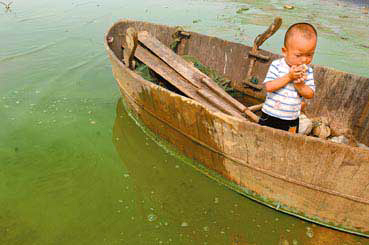The Chinese government has decided to invest largely in developing technologies to treat water pollution, according to the State Environmental Protection Administration (SEPA) Monday.
The State Council, or the cabinet, has approved three big state-funded programs for the research and development of such technologies, said Zhao Yingmin, a SEPA official.
The investment will be hundreds of million yuan, he said.
The programs, to last between 2008 and 2020, will support researches of technologies to remedy pollution of rivers, lakes, drinking water and those to monitor the water body environment.
The SEPA said earlier that 26 percent of surface water in China is totally unusable, 62 percent is unsuitable for fish and 90 percent of the rivers running through cities are polluted.
The latest survey showed that 32.3 percent of Chinese were unsatisfied with the local water environment while 20 percent were not content with the sanitation of drinking water in public places.
The survey, titled "2007 environmental protection and people's livelihood index," covered 9,011 respondents from 29 provinces and autonomous regions.
A project under the program will be carried out at Taihu Lake in the eastern Jiangsu Province. It had suffered a serious blue-green algae outbreak in summer 2007, threatening the tap water supply of more than 1 million residents in the lakeside city of Wuxi.
"The local environment authority will actively cooperate with scientists to help improve the water quality of the lake," said Shi Zhenhua, head of the provincial environmental department.
(Xinhua News Agency January 15, 2008)






